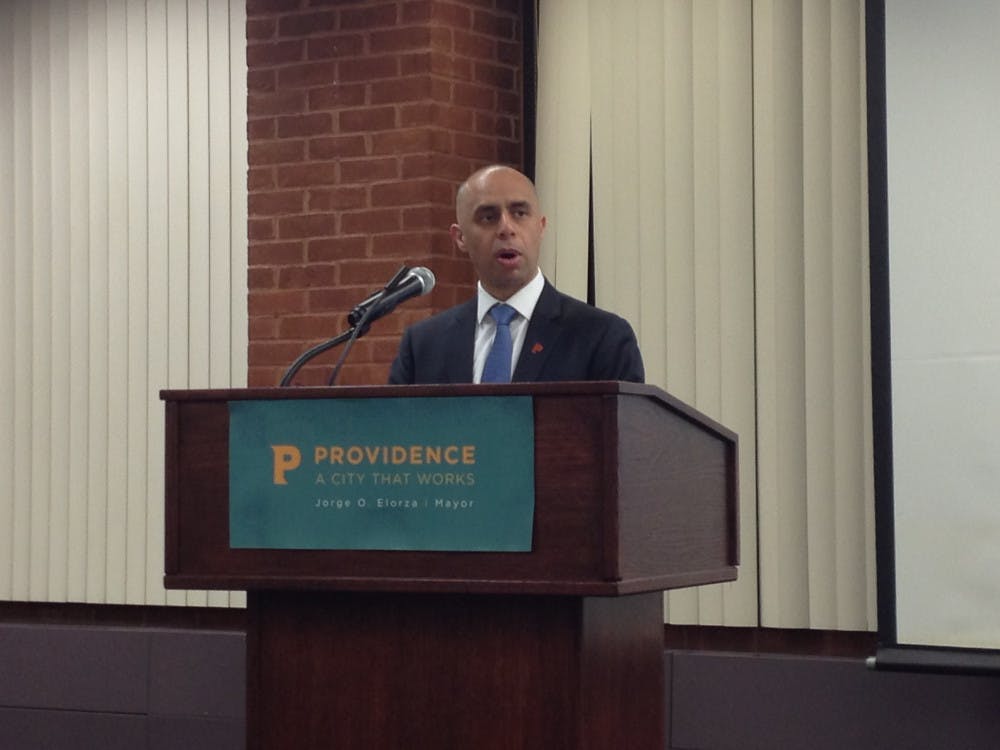Providence small business owners gathered Tuesday night for a community forum hosted by Mayor Jorge Elorza in the Joseph A. Doorley Jr. Municipal Building to highlight new opportunities for loans and programs designed to streamline business development.
“Small business is the lifeblood of the community,” Elorza told the mostly Latinx audience, as an interpreter translated his words into Spanish.
Elorza presented the Office of Economic Opportunity’s Providence Self-Employment Program, aimed to offer unemployed and underemployed residents the opportunity to gain financial literacy and business skills.
The Self-Employment Program was created to aid the lengthy loan application process. To qualify for loans and expanded city support, entrepreneurs need to present a profitable business idea with a well-constructed business plan. This process can be difficult for people without prior experience or business education, said Maryellen O’Mahony, director for the Center for Women and Enterprise.
“It’s really hard to make a business plan. You need to really know all the necessary mechanics,” said O’Mahony, whose organization will provide free classes and one-on-one mentorship to 100 Providence residents and 125 Spanish-speaking residents through the Self-Employment Program.
The initiatives are in part meant to bolster an already existing mandate in which at least 10 percent of Providence business contracts go to companies run by women and at least 10 percent of bids for city-funded projects are given to minority-owned companies, according to State Rep. Grace Diaz, D-Providence.
The key, Diaz said, is to expand the pool of minority- and women-owned companies eligible to receive city contracts, especially for construction work. She noted the importance of reaching out to Providence’s large Latino population.
“Latinos have less access to capital — they are often coming from low-income families, which makes it hard for them to put up their own capital up front,” Diaz said. “They still need capital, and I think the city can help make the process clearer and simpler.”
Early stage entrepreneur funding is limited and, as a result, it’s important for applicants to be prepared and technically well-versed in the business world, said Brian Hull, director of the Office of Economic Opportunity for Providence.
“You are not going to get a long-term loan for your start-up without demonstrating a business plan and a bankable business idea,” Hull said. Educational initiatives like the Self-Employment Program are crucial to build up necessary skill sets, he added.
The city must extend support to small business owners to expand their businesses, said Tom Hoagland, director of the Providence Business Loan Fund.
“Big banks are not as well-equipped anymore to deal with small businesses,” Hoagland said.
Some businesses, like restaurants and beauty salons, can have trouble obtaining funds from large banks because they have a high turnover rate and are considered risky, with limited profitability, he added.
The PBLF offers loans of $50,000 to $250,000 for established businesses that have had their loan applications turned down by local banks, and hopes to inject nearly $2 million into Providence businesses over the next three years.
Hoagland encouraged business owners in the room to approach him for advice and share what they learned with their colleagues.
“The process to get a small business loan is very tedious,” said Roberto Castellanos, who operates a dry cleaning business with 10 employees. “It’s a lot of work, and it costs a lot of money, and while there’s been a lot of effort to make progress, there are still a lot of challenges.”
Following the speeches and a question-and-answer session, representatives from a variety of organizations, such as Goldman Sachs’ 10,000 Small Businesses program, handed out flyers and answered questions.
Juana Flores, who owns a clothing store called Bella Boutique, said she planned to share the information with her two daughters, who each run their own cleaning businesses. She hopes they can all qualify for loans to expand their businesses.
“I feel content because I learned a lot,” Flores said. “There is help offered, projects open for us, and we want to be part of them.”





